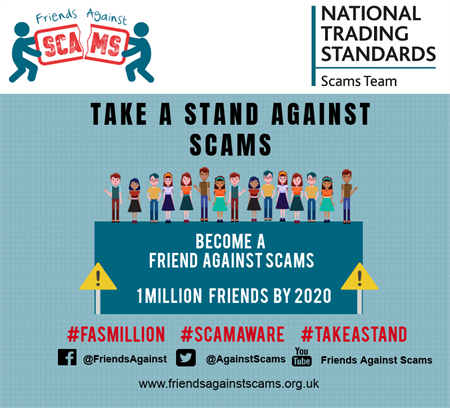Scams
A scam is an attempt by a person or organisation to mislead you into giving them money by telling you something which is not true.
them money by telling you something which is not true.
These can take many forms and can come via the post, telephone, email or in person. If you are confronted by something that you suspect may be a scam, keep the following checklist in mind:
- Stop - If something seems too good to be true, it probably is
- Check - Where is the offer from? Do you have an address? Do you know and trust this person?
- Privacy - Don't give away personal details about yourself – these could also be used for identity theft purposes
- Be cautious and listen to your instincts. Don’t be afraid to hang up, bin it, delete it or shut the door.
- Take your time; don’t be rushed.
- Ask for ID. If someone claims to represent a charity, ask them for ID. Be suspicious of requests for money up front. If someone attempts you into accepting a service they are unlikely to be genuine. Check with family and friends before accepting offers of helps if you are unsure.• If you are online, be aware of fake news and use trusted sources such as .gov.uk or NHS.uk websites. Make sure you type the addresses in and don’t click on links in emails.
- Only purchase goods from legitimate retailers and take a moment to think before parting with money or personal information.• Know who you’re dealing with - if you need help, talk to someone you know or get in touch with your local Council on the numbers below.
- Protect your financial information, especially from people you don’t know. Never give your bank card or PIN to a stranger.
Report a Scam
You can report scams to Citizens Advice Consumer Service on 0808 223 1133 or South Wales Police on 101.
You can also get advice or book a face-to-face appointment with a Scams Action adviser at Citizens Advice. The service is open from Monday to Friday, 9am to 5pm (closed on bank holidays). Please call 0808 250 5050.
Our key partners provide further advice on scams.
Citizens Advice – Common Scams
Action Fraud To report fraud, including online or internet crimes and receive a police crime reference number
Age UK - Avoiding Scams
Think Jessica - A campaign which highlights mass postal frauds and scams
Older People's Commissioner for Wales - Find details of local and national organisations that you can contact for support if you are affected by abuse
Friends Against Scams
To learn more about different types of scams and how to protect yourself and others, visit FriendsAgainstScams and complete the free online training.
Why not become a Scam Marshal?
A Scam Marshal is any resident in the UK who has been targeted by a scam and now wants to fight back and take a stand against scams. Scam Marshals do this by sharing their own experiences, helping others to report and recognise scams and sending any scam mail that they receive to the National Trading Standards Scams Team so that it can be utilised as evidence in future investigative and enforcement work.